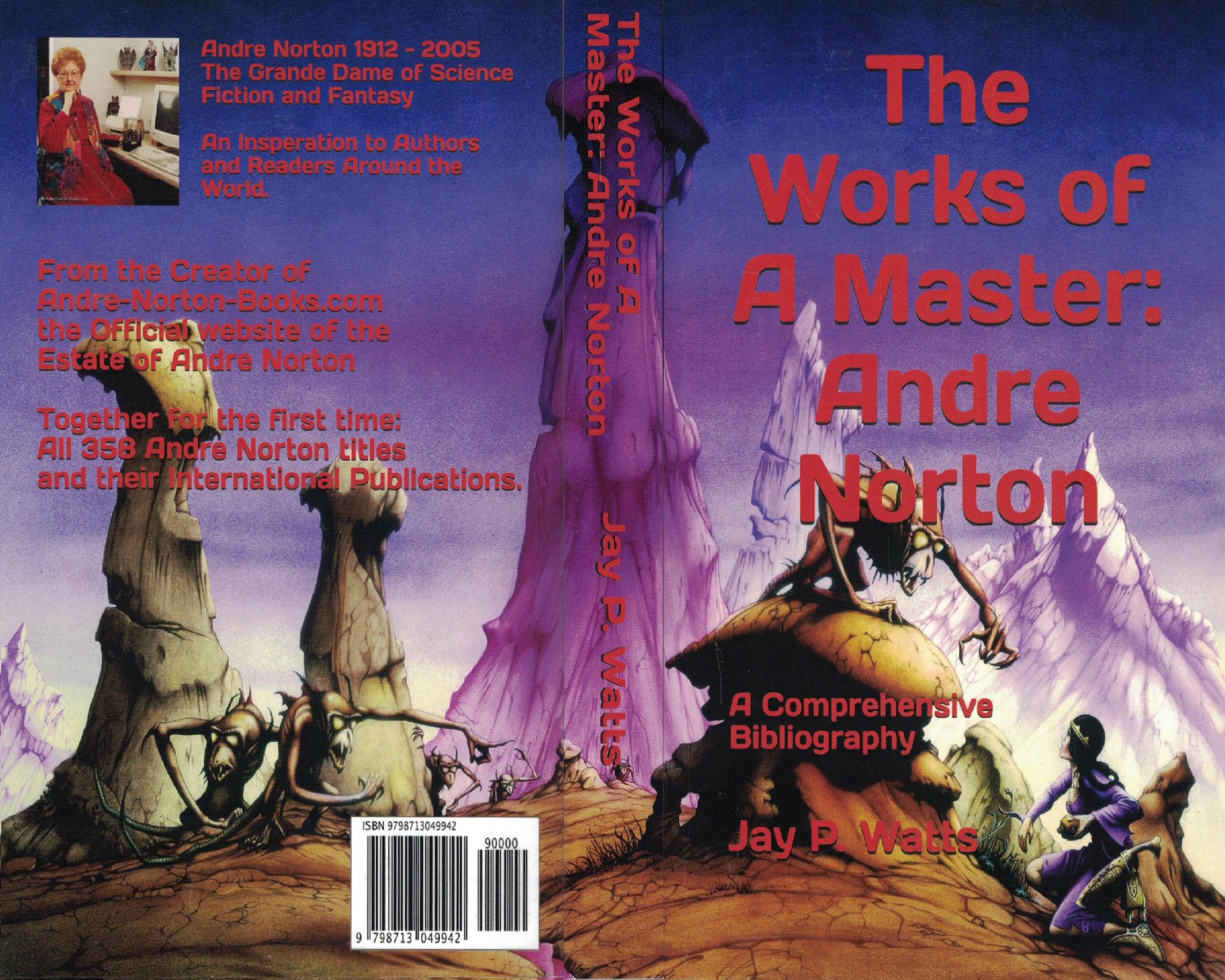Visiting Miss Norton
by Steven R. Vogel ~ March 15, 2015
The roads from Minnesota to Tennessee grow quickly warmer and kinder as one travels south at the end of winter. Almost any reason is enough to stay tucked until the northern thaw has made a full commitment because no one can predict what adventures might accompany an escape during the blizzard season, which can extend through April, and sometimes into May. Our family’s plenty-good reason to travel south was a most precious meeting with the Grand Lady at her incomparable library, High Hallack.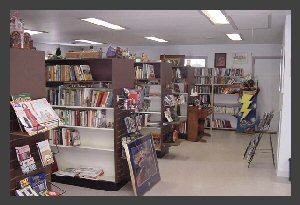
It doesn’t seem quite right to say we were driving to meet her for the first time, for she had already traveled the universe to meet us where we were. In my case, that was between the stacks of the Junior High library in Bemidji—in northern Minnesota. (I can still see those lightly-shadowed, silent corridors; they were heavy—almost sticky—with anticipation of her latest book.) A misfit kid fresh-come to the tourist, lumberjacking, college town from a four-room schoolhouse set well back into the jack pines might well look about and shrink away. That would be a good time to learn to read in earnest. That was the perfect time to encounter Miss Norton and to meet her multi-featured women and men, natives, strangers, and changelings—tentative, confident, and otherwise. Her protagonists resembled several of my classmates: my Chippewa friends—and the untidy, skittish throngs that skulked the lunchroom and hallways, many of whom seemed a bit alien to me (especially those girls!). Because I wanted to understand it all, Grandmaster Norton taught me to read (her stories were so compelling I had to learn to receive them)—and once I had begun, there was no going back.
Those who love Miss Norton know how well she fascinates the constant, driving, changing adventure of life; the tangled curiosities; endless possibilities and hopes found in the least expected places. She wonders the thrill of a story the way a cat fascinates a ball of yarn. When the cat has done, you may find the beginning and the end, but getting from one to the other involves breathtaking loops, twists, and intricacies like you have not seen before. And so it is with her tales. You pause to catch a breath, to reflect on astounding circumstances and captivating vistas. You take time to navigate strange emotions, confounding predicaments, novel adaptations, and unexpected resolutions. But you need no time at all to identify with the unique characters Miss Norton shepherds through her gripping adventures. At first, you may not even notice that one of them is you: You are her pride and joy, her enduring reward!
We set out to visit Miss Norton when our children were nearing the age I had discovered her many universes. We tucked some of her books into luggage zippers and car side pockets and read ourselves halfway to Arcturus. We read ourselves through ornery swipes of weather and into a snuffy auto repair shop (with sea-foam vinyl seats in the waiting area) for a Friday afternoon of tinkering on the old van. We think we can get the part in by tomorrow. There is a motel along the highway—other side of town; should be room. Ed can drop you off. There was room for us—and room for creaking memories, haunts, and sounds in the night. Had anyone stayed here during the past year? What must it be like to hole up in the back of a lost Illinois motel with a colorless TV week after week after month, the insistent bell ringing only at mighty intervals?
But the interstate took us back soon enough, and we read more easily at high speed because we knew we were headed for better adventures—our silver rocket knew the way, now that its machinery was working again. Miss Norton’s invitation had been more warm and kind than southern hospitality itself. Years before, she had replied to a shy letter sent to her by a college freshman. All four of your ideas for stories are good ones. In fact, all of them have been used as plots for books (she included the titles and authors). How am I able to author several books per year? She rehearsed the joys and disciplines of writing and encouraged me (as she encouraged countless others) to learn them for myself.
There followed a scatter of phone calls and decades of reading her works—spellbinding layers of wonders: Who, but Miss Norton, could reveal what was so hidden, so cherished in each person—even premonitions of hearts? I have never experienced such aching anticipation for meeting someone as I did during that drive to Tennessee. Dare I speak her name when we finally met?
We crept past her house to the converted-garage library behind it on a clear, warm afternoon (winter had been banished here and flora held the yard!). The great tree in the front gave shade only to the house. Where the drive widened was a bold splash of light. Should we go directly to the library or announce ourselves at the house? We did not need to decide, for Miss Norton had already made her way out to meet us. She smiled in the most winsome way and beckoned us as she might a clan of prodigals.
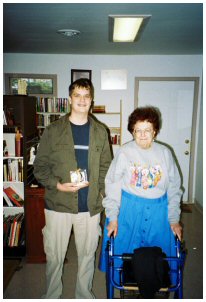 I stumbled for words as we stood before this lovely person who seemed so like my creator. Her grace and charm took over: How were your travels? Sea-foam vinyl seats, secretive service bays, and impenetrable diagnostic consoles at the cavernous, abandoned car shop. Which tale had she written that had put me in mind of our repair detour? Were there not Forerunner installations deep in the planet with whirring, flashing instruments that had waited so long for their designers’ return? (Surely I had seen such a setting before; did those Forerunners favor sea-foam green?) And who are these young ones? Off went the kids for affirming, personalized tours of the library. There hangs King Arthur’s sword, “Excalibur,” (heavily bejeweled) above the arch. Take it down and feel the heft!
I stumbled for words as we stood before this lovely person who seemed so like my creator. Her grace and charm took over: How were your travels? Sea-foam vinyl seats, secretive service bays, and impenetrable diagnostic consoles at the cavernous, abandoned car shop. Which tale had she written that had put me in mind of our repair detour? Were there not Forerunner installations deep in the planet with whirring, flashing instruments that had waited so long for their designers’ return? (Surely I had seen such a setting before; did those Forerunners favor sea-foam green?) And who are these young ones? Off went the kids for affirming, personalized tours of the library. There hangs King Arthur’s sword, “Excalibur,” (heavily bejeweled) above the arch. Take it down and feel the heft!
And here are painted maps of the lands to the East, and lands to the South and West. You will want to learn them well as you prepare to travel there. There were models and representations of every place, people, and creation. Miss Norton explained several of these to my youngest son. Did you know the Chinese were the first to have a functional submarine? She pulled a small model from a shelf and told him its story. Then she gave it to him for safekeeping. It remains on the shelf where he keeps his sundry imaginations, gargoyles, and a few dragons.
We had entered a wholly other world. The library was well beyond mastering in a short time. What most engaged us were the many ranks of books on design, costuming, music, art, architecture, gemology, history, archeology, nomenclature, weaving, natural science, political theory, geography, and the like. There were endless volumes of fiction and nonfiction written by every author one could hope to read! And all of the sections were arranged in well-labeled, orderly ranks. There were mobiles overhead and fantastic paintings and illustrations on every wall. Here was a listening area, over there a computer station.
This was a place to research, to think, to write—to turn several corners on a journey toward excellence! But more amazing than all of this, was the fact that Miss Norton and her staff had created this singular haven to be a place for encouragement, teaching, collaboration, and inspiration, and she was at the heart of it.
It was humbling and inspiring to speak with Miss Norton about her approaches to work, inspiration, and story development, and to discuss her philosophies of literature and aesthetics. She spoke readily about the ways of humankind, of nature, of the world. Nothing escaped her. She conversed expansively about the news of the day, the news of the past year—of each prior decade: science, politics, arts. Everything.
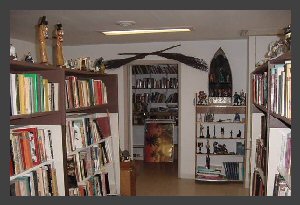 Oh, the things I wanted to know! How? Why? When? Have you ever thought? I dare not describe the wonder and beauty I captured only sparsely in the notes I made during our conversation that day in her sanctuary. Bits trickle out with the passing years. I like to center each story on action, with constant development and movement to keep the reader’s attention. Why? There was good reason why. She also had good reasons for choosing vulnerable characters of humble means to observe a world and to record their thoughts. To look hope and despair in the face. To work out the rewards of perseverance, thoughtfulness, loyalty, trust, carefulness, creativity, and even risk taking.
Oh, the things I wanted to know! How? Why? When? Have you ever thought? I dare not describe the wonder and beauty I captured only sparsely in the notes I made during our conversation that day in her sanctuary. Bits trickle out with the passing years. I like to center each story on action, with constant development and movement to keep the reader’s attention. Why? There was good reason why. She also had good reasons for choosing vulnerable characters of humble means to observe a world and to record their thoughts. To look hope and despair in the face. To work out the rewards of perseverance, thoughtfulness, loyalty, trust, carefulness, creativity, and even risk taking.
There are only so many plots for a story. (It was the first time I had heard this.) It is the telling that makes all the difference. Miss Norton was always more interested in the person than the thing. (Her technology tended to be matter of fact—no great detail regarding inner workings; she wrote much more about the ways machines had become part of life and its challenges.) It was the person living, moving, meeting every new thing or entity and adapting, reworking, finding a way to peace that she found interesting. She did not focus much on the person who could contemplate in circles and never get beyond second guessing. What do we know of life and of the world? Not everything! And there will be something new tomorrow to learn, to incorporate, or to refuse.
I do not see the need to use profanity and vulgarity. Some have suggested that this is because I write for young people, but that is not the reason. Miss Norton knew as well as anyone that there is always more than one way to respond to challenges that come from within or without—and that not all responses are of equal value. She described the several books she was reading at the time. What satisfaction and joy these brought her! But they could bring dismay, too. She noted that some authors’ rely on rude devices, and she wished for better.
Conversing with The Lady was akin to the rare super-dream that relates to great swaths of life and that seems so intimately tied to otherworldly acumen, portent. I had learned as a youth (from the heart out) that thrill, intrigue, and passion are often found by those who take life on in gusts. By those who move toward, not away from, questions—by those who seek obscure solutions and benefits when the ready options have failed. I had learned that striving and accomplishment are themselves of great value, and that nothing can be substituted for faithfulness and honor. I had learned many of these things by reading Andre Norton. But what my heart already knew, I was now hearing explained in a most remarkable way by The Lady herself: Her orderly, purposeful, long-considered approaches to storytelling had at their center one thing: I want to entertain. I most of all want my readers to escape. There is enough in life that is discouraging and menial. It is good to leave those things behind and to be taken to another place for a few hours.
It was refreshing to hear her insist that it is good to have adventures and to be entertained in positive ways. Her characters did not spend time in didactics; nor did they preach or scold. They lived from one moment to another, and they reaped kindness or shame as it applied in a most natural way. People at the edges of society discoursed and exchanged with others who were at the center. Even the most unlikely protagonists and villains lived to know compassion, understanding, and love—or they did not. But we who read her learned much about these things.
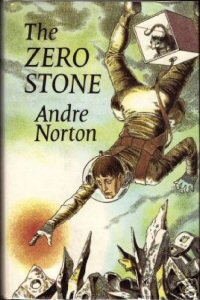 Many of Miss Norton’s stories were inspired by nature (especially by plants and animals), and a great many other tales centered on things she had about the house (things she had found at the market, an item a friend had given her, odd magazine photos). These two categories were not mutually exclusive, for the parts of nature that could be moved often had been carried indoors. She kept green plants, rocks and semiprecious stones, crystals, wood carvings, and other manifestations of her love for the natural world all around her. And there was a good dose of cats! My family were intrigued by the many things she described that had stirred her to write, and she encouraged them to go to the house for a kind of guided object hunt. Be sure to show them Hob’s Pot … and the Zero Stone!
Many of Miss Norton’s stories were inspired by nature (especially by plants and animals), and a great many other tales centered on things she had about the house (things she had found at the market, an item a friend had given her, odd magazine photos). These two categories were not mutually exclusive, for the parts of nature that could be moved often had been carried indoors. She kept green plants, rocks and semiprecious stones, crystals, wood carvings, and other manifestations of her love for the natural world all around her. And there was a good dose of cats! My family were intrigued by the many things she described that had stirred her to write, and she encouraged them to go to the house for a kind of guided object hunt. Be sure to show them Hob’s Pot … and the Zero Stone!
In our few moments alone, Miss Norton offered me several deep insights and suggestions regarding a project I had outlined to her briefly. I caught my breath, for she had captured the entire matter in a few minutes, and she had gone straight to the hitch I had been missing for years.
It seems impossible that anyone could exceed the love she gave, for The Lady encouraged and helped many people so graciously. She asked for nothing in return, but an excellent way to thank her may be to pass on what she gave so kindly and generously: her insights, her curiosities, her work ethic, her love for the written word, her compassion and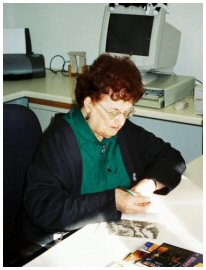 hopes for everyone around her, and her commitments to protect and enjoy the world we share. Perhaps another good way to thank Miss Norton would be to invest good time, and to make sincere efforts to improve, each time one writes, each time one reads. I asked her if she would be willing to read a humble poem I had written to honor her on the occasion of our meeting. Her smile and her thank you are precious still.
hopes for everyone around her, and her commitments to protect and enjoy the world we share. Perhaps another good way to thank Miss Norton would be to invest good time, and to make sincere efforts to improve, each time one writes, each time one reads. I asked her if she would be willing to read a humble poem I had written to honor her on the occasion of our meeting. Her smile and her thank you are precious still.
We walked together to the house to join the others, who were soon to set for tea. Our light conversation took us everywhere in the natural and peculiar world, and none of it was spent on anything unhappy. She invited us to return in the morning to browse her personal collection of her writings. What we did not expect was the priceless description she gave for each item in the collection. As she sat at her desk, so regal in her emerald outfit, she slowly paged through every book and told how each one had come to be, how the styles varied, what research had gone into it, about the adventures associated with its production: This one is a Ruritanian adventure. This is about the lost Roman legion. Here is a French fairy tale. Each one had a story, and each one was a story. It is impossible to know who enjoyed that review the most, for there was delight throughout it (with many asides to the young ones).
We have taught our children that every library is packed with information, ideas, and adventures beyond exhausting. Now the books are everywhere. Not a week passes that does not make way for another book, and many of them stay. Not one room and not one vehicle is without a book—a book that holds a marker. Every celebration introduces more of them. I learned at a young age that books are precious. When I discovered that Miss Norton was once a librarian, I came to believe that all libraries belonged to her. In fact, they did—and still do.


